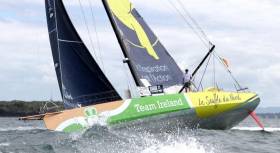Displaying items by tag: Journey to the Edge
From Enda O’Coineen, in business and adventure, we can learn much. The man sails on a sea of obsession in life — guided only by the goals he sets himself.
He became the first ever Irish entry to qualify for the Vendée Globe. When he didn’t succeed in the solo circumnavigation at his first attempt, due to a broken mast, his default mode was to try again — and he sailed into the history books.
In his daily jousts with the elements at sea, the entrepreneur concludes that for every risk, there is a massive potential for reward and giving back.
But he is alarmed by rules, regulations and controls, hidden in the name of safety and security. Fundamental freedoms are being lost, he says.
The genius is in understanding the balance.
Every four years, an elite group of sailors endeavours to sail single-handed, non-stop in a circumnavigation of the planet, through the most unpredictable and perilous conditions imaginable.
They are the competitors in the Vendée Globe — one of the most arduous, challenging and dangerous events in sport. These sailors know the real adversaries are the waves and the weather, the ice and isolation.
The 2016 race had an Irish skipper competing for the first time, as Irish businessman Enda O’Coineen sailed the Kilcullen Voyager into the annals of sailing history.
But this grand solo voyage did not go to plan.
Also the subject of a documentary that screened as part of the IFI Documentary Festival last month, Enda O’Coineen’s bid to complete the Vendée Globe has been recounted in his own words in a new book.
Journey to the Edge: An Amazing Story of Risk-Taking in Business and Adventure, by Enda O’Coineen, is available from the Afloat shop at €14.99.





























































